

Podlaska Digital Library - Z życia Polaków we Francyi : rzut oka na 50-letnie koleje Towarzystwa Historyczno-Literackiego w Paryżu, 1832-1882. Wielka Emigracja – Wikipedia, wolna encyklopedia. XIX-wieczna grafika przedstawiająca scenę przyjęcia polskiego emigranta we Francji XIX-wieczna grafika przedstawiająca scenę powitania polskich emigrantów w Belgii Wielka Emigracja – ruch emigracyjny polskiej ludności w pierwszej połowie XIX wieku.
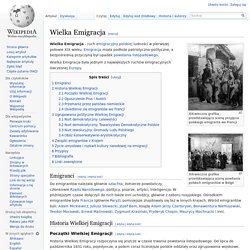
Emigracja miała podłoże patriotyczno-polityczne, a bezpośrednią przyczyną był upadek powstania listopadowego. Wielka Emigracja była jednym z największych ruchów emigracyjnych ówczesnej Europy. Emigranci[edytuj | edytuj kod] Historia Wielkiej Emigracji[edytuj | edytuj kod] Początki Wielkiej Emigracji[edytuj | edytuj kod] Dla Prus i Austrii sytuacja stawała się kłopotliwa. Przede wszystkim wszyscy żołnierze zostali rozbrojeni. Kiedy więc 1 listopada 1831 roku car ogłosił amnestię wielu Polaków, tęskniących za domem lub zwiedzionych rosyjskimi obietnicami łaski zdecydowało się na powrót do kraju. W wyniku tych działań ogółem na terenie Prus i Austrii pozostało pod koniec 1831 roku blisko 5 tysięcy byłych powstańców. "Great" Polish political Emigration (1831 - 1870) Table of Contributors Table of Contents Return to Encyclopedia Home Page "Great" Polish political Emigration (1831 - 1870) Since the end of the 18th century, a major role in the Polish political life was played by people who carried out their activities outside the country, as emigres.
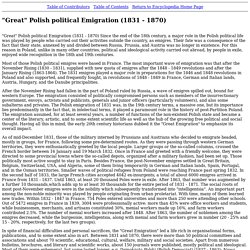
Their fate was a consequence of the fact that their state, annexed by and divided between Russia, Prussia, and Austria was no longer in existence. For this reason in Poland, unlike in many other countries, political and ideological activity carried out abroad, by people in exile, enjoyed wide recognition in the 18th and 19th centuries. Hôtel Lambert (obóz polityczny) – Wikipedia, wolna encyklopedia.
Jan Nepomucen Kościuszko. Aleksander Kraushar, Książę Repnin i Polska, t.
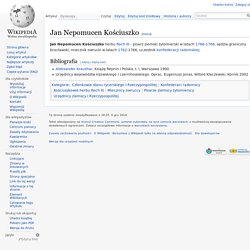
I, Warszawa 1900Urzędnicy województw kijowskiego i czernihowskiego. Oprac. Eugeniusz Janas, Witold Kłaczewski. Kórnik 2002. Konfederacja radomska. Nikołaj Repnin, faktyczny inicjator zawiązania konfederacji Marszałkiem konfederacji generalnej został Karol Radziwiłł „Panie Kochanku”, marszałkiem litewskim był Stanisław Brzostowski, sekretarzem Marcin Matuszewicz[5].
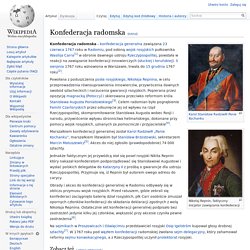
Akces do niej zgłosiło (prawdopodobnie) 74 000 szlachty. Jednakże faktycznym jej przywódcą stał się poseł rosyjski Nikita Repnin który nakazał konfederatom podporządkować się Stanisławowi Augustowi i wysłać polskich delegatów do Katarzyny II z prośbą o gwarancje dla ustroju Rzeczypospolitej. Polonia (Elgar) Polonia is a symphonic prelude by the English composer Edward Elgar written in 1915 as his Op. 76.
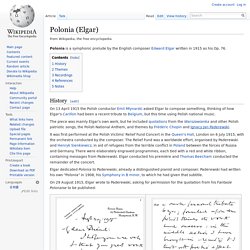
It was first performed at the Polish Victims' Relief Fund Concert in the Queen's Hall, London on 6 July 1915, with the orchestra conducted by the composer. The Relief Fund was a worldwide effort, organised by Paderewski and Henryk Sienkiewicz, in aid of refugees from the terrible conflict in Poland between the forces of Russia and Germany. There were elaborately engraved programmes, each tied with a red and white ribbon, containing messages from Paderewski. Elgar conducted his première and Thomas Beecham conducted the remainder of the concert.
On 29 August 1915, Elgar wrote to Paderewski, asking for permission for the quotation from his Fantasie Polonaise to be published: "My dear Friend, Polish opera. Polish opera may be broadly understood to include operas staged in Poland and works written for foreign stages by Polish composers, as well as opera in the Polish language. 17th century[edit] Operas were first performed in Poland during the Baroque era in the reign of Sigismund III Vasa (1587-1632).
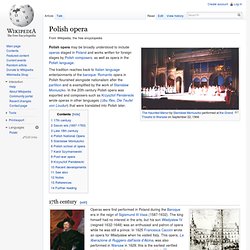
The king himself had no interest in the arts, but his son Władysław IV (reigned 1632-1648) was an enthusiast and patron of opera while he was still a prince. In 1625 Francesca Caccini wrote an opera for Władysław when he visited Italy. This opera, La liberazione di Ruggiero dall'isola d'Alcina, was also performed in Warsaw in 1628; this is the earliest verified performance of an Italian opera outside of Italy.[1] Committee for National Education - the first polish Ministry of Education - University of Warsaw. I.
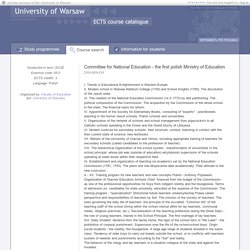
Trends in Educational Enlightenment in Western Europe.II. Modern school in Warsaw Nobilium College (1740) and School Knights (1765). The dissolution of the Jesuit order.III. The creation of the National Education Commission (14.X.1773) by diet partitioning. The political composition of the Commission. Nowość! I. Presentation of educational change in Western Europe, the creators of the new concept of education. History of philosophy in Poland. Ottoman Empire. The Ottoman Empire (/ˈɒtəmən/; Ottoman Turkish: دَوْلَتِ عَلِيّهٔ عُثمَانِیّه, Devlet-i Aliyye-i Osmâniyye, Modern Turkish: Osmanlı İmparatorluğu or Osmanlı Devleti), also historically referred to as the Turkish Empire or Turkey, was a Sunni Islamic state founded in 1299 by Oghuz Turks under Osman I in northwestern Anatolia.[7] With conquests in the Balkans by Murad I between 1362 and 1389, the Ottoman sultanate was transformed into a transcontinental empire and claimant to caliphate.
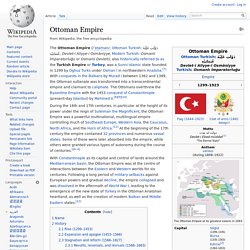
The Ottomans overthrew the Byzantine Empire with the 1453 conquest of Constantinople (present-day Istanbul) by Mehmed II.[8][9][10] With Constantinople as its capital and control of lands around the Mediterranean basin, the Ottoman Empire was at the centre of interactions between the Eastern and Western worlds for six centuries. Name[edit] History[edit] Rise (1299–1453)[edit] Partitions of Poland. The First Partition of Poland was decided on August 5, 1772.
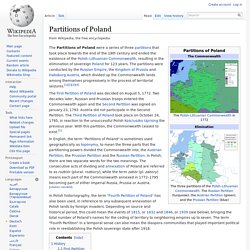
Two decades later, Russian and Prussian troops entered the Commonwealth again and the Second Partition was signed on January 23, 1793. Austria did not participate in the Second Partition.